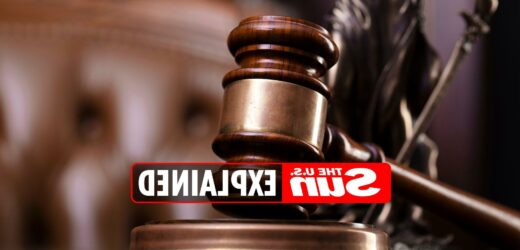"Objection! Hearsay!" is a phrase you've probably heard in your favorite legal drama or movie.
However, what qualifies as "hearsay" and what doesn't is much more complicated than you may think.
What is hearsay?
According to LawShelf, the hearsay rule "prohibits witnesses from testifying as to what other people told them to ensure that people testify only as to what they observed firsthand."
Federal law defines hearsay as "an out-of-court statement offered for the 'truth of the matter asserted.'"
An out-of-court statement is something someone told the witness, whether face-to-face, on the phone, via voicemail, through text message, in a letter, on social media, or even through a head nod or other non-verbals.
The "truth of the matter asserted" part is where the hearsay law gets a little bit tricky.
READ MORE ON THE US SUN
Who is Johnny Depp’s lawyer?
For example, if Maria said under oath that she'd heard Josh say "I can't believe that Robert tricked me! I'm going to steal his bike!"
This would be considered hearsay because Maria overheard it outside of court, and it offers evidence of Josh stealing Robert's bike.
However, if Maria testified that she'd heard Josh say "I can't believe Robert tricked me!" before storming off, this is not considered hearsay.
This isn't considered hearsay because it doesn't matter whether or not the statement was true about Robert tricking Josh, it simply shows Josh's state of mind.
Why is the hearsay rule important?
According to LawShelf: "The hearsay rule is designed to protect the efficacy of cross-examination, which allows opposing parties to try to impeach witness’ testimony or draw testimony that might mitigate the value to the other parties.
"However, if the witness is testifying as to what someone else told him or her, cross-examination can be ineffective."
MOST READ about COURT
LOFTY AMBITION Our neighbour's extension is TOUCHING our home – we want it tearing down
What to know about a motion to strike in legal proceedings
Amber Heard begins fightback in libel trial against ex-husband Johnny Depp
Everything to know about Samuel Alito and his political career
Simply put, it's important because it allows a witness to be cross-examined.
Let's say for example you personally saw a blue Honda run a red light.
The opposing party's lawyer may ask you questions during your cross-examination such as:
"Do you wear glasses or contacts?"
"Were you wearing your glasses or contacts that night?"
"Are you colorblind?"
"Did you get any of the license plate numbers on the blue Honda before you saw it run the red light?"
These are all questions that you could personally answer, meaning no hearsay would occur.
However, if your friend Dave told you he'd seen the car run the light, you would have to commit hearsay to answer, meaning your cross-examination would be irrelevant.
What are some of the examples of exceptions to the hearsay rules?
A common misconception is that anytime someone says something that they are repeating, it is hearsay.
However, this is not the case.
For example, it doesn't count as hearsay if the person who told the other person did so as a "present sense impression."
An example from LawShelf cites, "if a person calls 911 and says, “There’s a fight going on outside my window and the big dude in the black sweater is pounding the little guy in red,” the 911 operator can testify as to what the caller said, even if the caller is never identified."
Another example of when shared information doesn't count is when it's told for purposes of obtaining medical treatment or diagnosis.
Nothing in this rule says where it has to be made, or to whom, just that it must be made to someone who could reasonably assist with medical treatment.
Read More On The Sun
Harrowing final message of former Miss USA reveals chilling way she timed text
Kourtney SLAMS mom Kris for not inviting kids to engagement party to Travis
This means that if you told the EMT that your partner had pushed you down a flight of stairs, the EMT could then repeat that in court without it counting as hearsay.
However, it's ultimately up to a judge what is or is not allowed in their court room.
We pay for your stories!
Do you have a story for The US Sun team?
Email us at [email protected] or call 212 416 4552.
Like us on Facebook at www.facebook.com/TheSunUS and follow us from our main Twitter account at @TheSunUS
Source: Read Full Article











